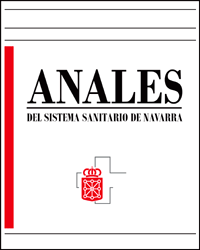Nuevas estrategias terapéuticas en diabetes mellitus tipo 1
Palabras clave:
Diabetes mellitus tipo 1. Células madre. Trasplante de páncreas. Islotes.Resumen
El principal determinante del riesgo de complicaciones derivadas de la diabetes mellitus tipo 1 se debe a los altos niveles de glucosa en sangre mantenidos durante largo tiempo. Para conseguir un beneficio terapéutico en pacientes con diabetes mellitus es necesario desarrollar tratamientos que permitan de manera segura, efectiva y estable mantener la normoglucemia. Lamentablemente, el tratamiento de la diabetes mellitus tipo 1 mediante el aporte exógeno de insulina no es capaz de conseguir niveles estables de glucosa en sangre, de manera que con frecuencia se producen casos de severa hipoglucemia o hiperglucemia. Hasta la fecha la única solución para reestablecer de manera permanente la normoglucemia se consigue mediante el trasplante de páncreas o de islotes pancreáticos. Sin embargo, a medida que se incrementa el número de centros especializados en el trasplante de islotes, mayor es la necesidad de islotes para su trasplante. Así pues, el estudio de nuevas fuentes de células productoras de insulina así como de nuevos tratamientos que permitan preservar o incluso aumentar la masa de células beta en los pacientes con diabetes mellitus representa un objetivo de primera necesidad en este campo. En este sentido, en la última década ha habido un avance significativo en el campo de la biología de las células madre. Sin embargo, la identificación de células apropiadas para la generación de nuevas células beta, además del desarrollo de técnicas para la caracterización de estas células, así como de ensayos y modelos animales apropiados para probar su capacidad de diferenciación tanto in vitro como in vivo son de vital importancia para la puesta en marcha de nuevas estrategias terapéuticas basadas en la aplicación de las células madre para el tratamiento de la diabetes mellitus tipo 1.Descargas
Descargas
Publicado
Cómo citar
Número
Sección
Licencia
La revista Anales del Sistema Sanitario de Navarra es publicada por el Departamento de Salud del Gobierno de Navarra (España), quien conserva los derechos patrimoniales (copyright ) sobre el artículo publicado y favorece y permite la difusión del mismo bajo licencia Creative Commons Reconocimiento-CompartirIgual 4.0 Internacional (CC BY-SA 4.0). Esta licencia permite copiar, usar, difundir, transmitir y exponer públicamente el artículo, siempre que siempre que se cite la autoría y la publicación inicial en Anales del Sistema Sanitario de Navarra, y se distinga la existencia de esta licencia de uso.








